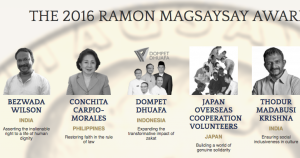Two Indians Carnatic singer T.M. Krishna and campaigner for eradication of manual scavenging Bezwada Wilson were among six persons who received the prestigious Ramon Magsaysay award for 2016 in Manila.
Ramon Magsaysay Award :
The Ramon Magsaysay Award is an annual award established to perpetuate former Philippine President Ramon Magsaysay’s example of integrity in governance, courageous service to the people, and pragmatic idealism within a democratic society.
- The prize was established in April 1957 by the trustees of the Rockefeller Brothers Fund based in New York City with the concurrence of the Philippine government.
- It is named after former Philippine President Ramon Magsaysay. The Ramon Magsaysay Award Foundation gives the prize to Asian individuals achieving excellence in their respective fields.
The awards were given in six categories, five of which were discontinued in 2009:
- Government Service

- Public Service
- Community Leadership
- Journalism, Literature, and Creative Communication Arts
- Peace and International Understanding
- Emergent Leadership
- Uncategorized
About T.M. Krishna :
M. Krishna is a Carnatic music vocalist. Hailing from a family of music connoisseurs, he was exposed to the south Indian classical music at an early age.
- His first concert was at the Spirit of Youth series organized by the Music Academy, Chennai (India). T.M. Krishna was born in Chennai on January 22, 1976.
- His father was a businessman in the automobile industry and his mother has founded several educational institutions, most recently a school for tribal children (Vidyavanam) which caters to over 300 children. www.vidyavanam.org
- Krishna’s mother learnt from Krishna’s guru Seetharama Sharma who on noticing Krishna’s interest in music,started teaching him when he was six years old.
- Krishna had his schooling in The School, an institution founded and run by the Krishnamurti Foundation which has influenced his perceptions and outlook towards life, a fact mentioned by him in various interviews.
- He received his degree in economics from Vivekananda College, Madras. Married to Sangeetha Sivakumar, who is also a Carnatic musician. On July 27, 2016, he was honoured with the Ramon Magsaysay Award.
About Bezwada Wilson :
He is an Indian activist and one of the founders and National Convenor of the Safai Karmachari Andolan (SKA), an Indian human rights organization that has been campaigning for the eradication of manual scavenging.
- He is well known as one of the leading figures of the Dalit movement in India. His work at SKA, a community-driven movement, has been recognized by the Ashoka Foundation which has nominated him a Senior Fellow. On 27 July 2016, he was honored with the Ramon Magsaysay Award.
- In 1986, Bezwada began his fight to endmanual scavenging. The first hurdle in his fight was at home: his parents and relatives said he should not focus his life on something that always existed. It was over years that they came to accept that he was dedicating his life to helping eradicate manual scavenging. Too many people within the community were ashamed to even admit manual scavenging existed or that they did it. Bezwada began breaking the silence.
- Bezwada also began a letter writing campaign, contacting the KGF authorities, the minister and chief minister of Karnataka, the prime minister, the newspapers, but they remained largely unacknowledged.
- In 1993, theParliament enacted the ‘Employment of Manual Scavengers and Construction of Dry Latrines (Prohibition) Act in 1993′, which banned the construction of dry latrines and outlawed the practice of manual scavenging. Despite the ban, the practice of manual scavenging continues across India.
- Bezwada took photographs of dry latrines and manual scavenging in KGF and sent it to P.A.K. Shettigar, the then managing director of KGF, threatening action under the Act. An emergency meeting was called to convert dry latrines into water seal latrines and transfer all scavengers to non-scavenging jobs. However, it was only when photographs were published in a 1994 article in the Deccan Herald, resulting in embarrassing questions in Parliament, that the Karnataka government was forced to acknowledge that manual scavenging continued to be a problem.
- Bezwada then worked for two years to organize manual scavengers in A platform, the Campaign Against Manual Scavenging (CAMS) was formed. This oversaw the conversion of dry latrines into flush toilets and rehabilitation of those who were engaged in manual scavenging.
- Wilson moved to Andhra Pradesh and began working with Paul Diwakar, a leading Dalit activist, and R. Sankaran, a retired Indian Administrative Officer. In 2001 the Andhra Pradesh government agreed to a total survey of the state to identify manual scavengers and dry latrines for liberation and rehabilitation. Bezwada prepared the survey format, where volunteers photographed and documented each manual scavenger and dry latrine.






